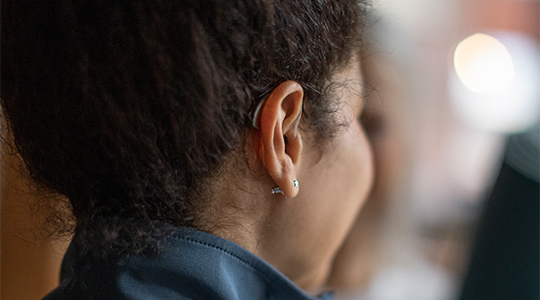The right hearing aid can restore your contact with your environment
If you are experiencing hearing loss, and if it is not a medical problem that can be treated with medication or surgery, then you should see a specialist in artificial hearing rehabilitation. The specialist is able to evaluate and select the appropriate hearing aid. Hearing aids restore our hearing to approximately normal levels, thus effectively improving your communication with the environment in which you live.
What can a hearing aid do?
To boost the sounds to the required volume that the degraded frequencies need
Bring clarity to speech in most conditions
Help you hear certain frequencies better, such as high-frequency consonants (σ, τ, θ, φ, and σ)
Allow you to participate in social events
Slow or even stop ongoing hearing loss
To enable you to become active and creative members of society (family, friends, work, fun) To reduce (in many cases) the intensity of tinnitus.


What can't a hearing aid do?
Restore your full range of normal hearing
Give you the ability to hear speech perfectly in the presence of other ambient sounds
To convert distorted sounds into clear sound
To allow you to listen only to what you desire
How does a Hearing Aid work?
Sound enters the hearing aid through a small opening and is picked up by the microphone. There is an amplifier inside the hearing aid that amplifies the sound. The amplified sound exits the hearing aid through the loudspeaker and is guided into the ear canal. A very small battery provides power to the handset. Depending on the type of hearing aid, the volume can be adjusted automatically by the device or by the user with a small slider on the outside of the aid. In modern headphones there is the possibility of connecting to a mobile phone and setting the handset through an application from the mobile as well as transferring the sound of the mobile phone directly to the headphones.


How long will a Hearing Aid last?
The life cycle of a properly maintained hearing aid is typically four to six years.
What should I know before getting a hearing aid?
Talk to your hearing care professional about whether a device would be a significant help in your situation. If so, determine together which aesthetic form and which technology is most suitable for you.
It is necessary to do a lot of research on the solutions provided. Ask about hearing aid types and technologies and ask for printed information and specifications. Visit the companies' websites and read more information. Find out if there is any scientific research on the recommended hearing aids that supports their advertised features.
Always have a relative or friend with you at your hearing aid appointment. Because you will be getting a lot of information gathered, it is helpful to have a second person who can judge and discuss with you the differences they saw in you during the tests.
Always attend the scheduled follow-up appointments that will be requested to properly monitor your adjustment.
Stay in touch with your hearing care professional during the initial fitting and fitting. Call them right away if the device doesn't work, hurts your ear, or makes a hissing sound when it's in the ear.
Keep a journal of your good or bad listening experiences. This will help and provide valuable information to your specialist during your next visit.
Write down the questions and difficulties you have on a piece of paper and mention them in your appointments with the specialist. On the same paper, write down the answers you receive.
